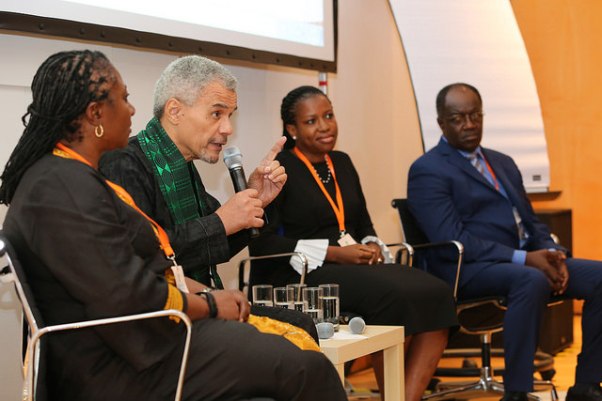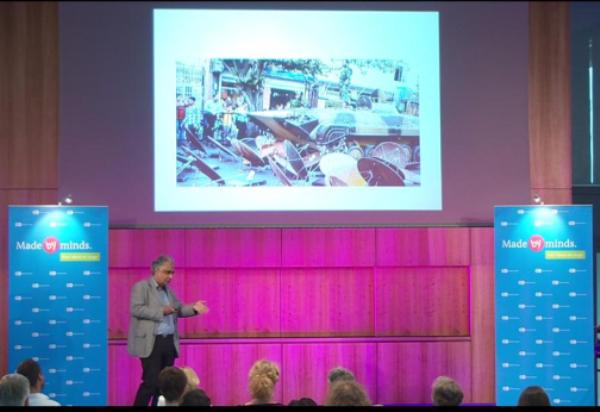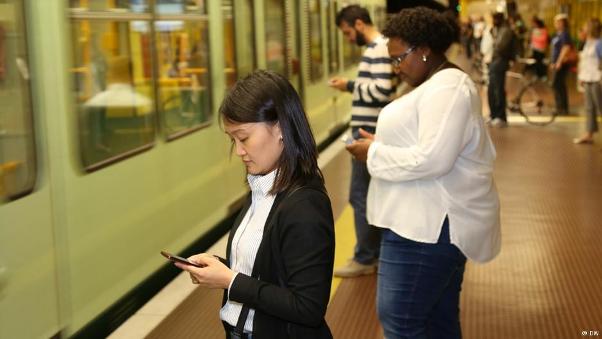Eco Heroes: A hands-on approach to environmental activism in Africa
At DW’s annual media conference, the Global Media Forum, Nigerian “Eco Heroes” appeared in a panel discussion hosted by Eco@Africa anchor Nneota Egbe to share their ideas and insight into environmental problems affecting Nigeria. The Eco Heroes share a common passion for raising environmental awareness and helping their communities through activism and innovation.
DW’s environmental program Eco@Africa shows the world that environmentally conscious innovation and development starts with people and communities. The coproduction from DW and Channels TV in Nigeria showcases both problems and solutions involving an array of environmental issues in Africa and Europe.
Environmental problems in Nigeria combine social, political and technical issues that the Eco Heroes addressed during their discussion. One pervasive environmental problem in Nigeria is plastic waste. Eco Heroes Bilikiss Adebiyi and Yahaya Ahmed, both take this on in creative and unexpected ways. Coca Cola alone sells around 4 million plastic bottles a week in Nigeria and the empty bottles can be put to good use. Adebiyi created an incentive for recycling by founding WeCyclers – a bicycle-powered recycling service in Lagos for densely populated and low-income neighborhoods. For their recyclable items, households receive reward points that they can exchange for goods and services – keeping plastic out of landfills and raising awareness in the community.
Ahmed, CEO of the Development Association for Renewable Energies (DARE) takes the bottles whole, fills them with sand and uses them in constructing homes, walls and water containers. DARE also looks at the social aspects of environmental problems and recruits people who have had to leave their homes because of increasing desertification.
The Eco Heroes also emphasized that social awareness is a crucial part of environmentalism in Africa. Each of them spoke about putting problems in terms that people can understand. For example, rather than talking about the “environment”, Desmond Majekodunmi said he prefers to think of a “life support system”– an idea that encourages people to act with care. He said educating children on environmental issues and doing simple things like planting trees are tangible ways to address such large problems.
A holistic approach to environmentalism combines social and structural issues. Priscilla Achapka, Executive Director of the Women Environmental Program, warns of a “social time bomb”, as lakes dry out and populations are forced together. Her work focuses on teaching women who run households sustainable solutions to everyday issues, which will create better living spaces in communities that will be growing closer together.
The Eco Heroes agreed that the media is essential for making these complex problems understandable and conveying essential information for environmentally conscious living. They praised DW, Channels TV and Eco@Africa for cooperating and helping to make a valuable contribution to raising awareness and spreading a positive message.
Eco@Africa has also proven to be a big success with audiences Nigeria. And after a successful start there, the show will soon be expanding to Kenya. Kenya Television Network (KTN) will be the new broadcasting partner for the show in East Africa. The expansion will provide a source of information that can make a positive difference to communities across the region. KTN has been a DW programming partner since 2012.
Finding allies in the cat and mouse game of censorship in Iran
In places where media freedom is guaranteed, censorship isn’t given a second thought. In places like Iran, people confront it every day. On television, newspapers, radio and online censorship in Iran is everywhere. There is a war of information in Iran with propaganda adding to the oppression of free information. People try and find information on the one side, and the government tries to stop it on the other.
In Iran, DW’s online content in Farsi has seen huge leaps in usage since Iranian authorities clamped down on the Iranian internet. By using circumvention techniques like Psiphon, DW has been able to provide people in Iran with unbiased news coverage. But it is a game of cat and mouse , and the rules change constantly. What worked a year ago often has to be changed. DW keeps up with the latest technology and has many partners with the same goal.
DW is joined by a group of international broadcasters known as the DG 7, which includes the BBC and France Médias Monde that meet and work together regularly to create solutions together and keep up with fighting censorship around the world.
Joining a plenary discussion on censorship at this year’s Global Media Forum is the Iranian journalist Arash Sigarchi. He is now Web Manager of Voice of America (Persian) in the USA. He was imprisoned for three years in Iran for using a blog and telephone interviews to try and get around government censorship. Now Sigarchi says that new possibilities of social media give people many ways to freely share information. This and the consistent effort of international broadcasters like DW to get through to people all over the world, can help ensure the future is built on truth.
DW brings fresh perspective to Washington DC
People around the world are closely observing Washington DC this election season and DW is now giving audiences there a new source of international news they can use to understand the world better.
After a successful broadcasting agreement with longtime partner Megaherz, DW’s English-language channel is now being carried around the clock in its entirety to over 400,000 households in the Washington metro area. The agreement was announced at an ceremony in Washington attended by the directors of both DW and Megaherz along with guests from politics, business and media at the Newseum, a museum dedicated to news and free expression.
DW is also closely covering the US election with a special segment on social media, #whatamerica. DW correspondents in Washington and elsewhere are following campaigns and travelling the country asking the audience what they want for the future of America. The project reveals a personal side to the issues and introduces ordinary American voters to an international audience.
Select DW programming in English has been available since 2015 on Megaherz’s international channel, MhZ Worldview, alongside other broadcasters like France 24, NHK World TV and euronews. DW (Amerika) broadcasts the full range of DW’s German-language programming across the Untied States, Canada and Latin America.
Market roundup: May 2016
Mobile
DW news content in English, German, French and Polish is now available on Samsung’s news aggregator app Upday. The app is a personalized news service developed by Axel Springer for Samsung phones in Europe. Full DW articles are now available on the service along with content from 1,200 major publications in Germany, France, Great Britain and Poland such as Spiegel, Le Figaro, The Telegraph and Onet.pl.
Asia
TonTon, the largest OTT platform in Malaysia now includes DW’s English-language channel TonTon currently has over 5 million subscribers with on-demand and live programming via DSL. DW is available on TonTon along with a small selection of other international broadcasters.
DW has a new cable partner in India. Maa Tara Cable Network is now broadcasting DW’s English-language channel to 50,000 household in the eastern Bihar region.
Africa
A selection of DW television programming is now being broadcast by Radio Flash FM’s new television station, Flash TV. DW has been a partner of Radio Flash FM in Rwanda since 2007.
South America
The Chilean cable provider Mundo Pacífico now includes DW (Latinoamérica) in its digital TV package. Mundo Pacífico has a large share of the pay TV market in Chile and will help increase DW’s technical reach in the region.
Laughing in the face of terror
Terrorism, extremism and corruption are things Ahmed Al-Basheer knows personally. The Iraqi comedian has lost two family members to terrorist militias and would face great danger if he returned to Iraq. Nevertheless, Al-Basheer maintains a strong sense of humor and directs scathing satire and absurd jokes at everyone from Islamic State terrorists to corrupt officials.
Every two weeks, Al-Basheer and his team use their own money to produce “The Al-Basheer Show” from a private residence in Amman, Jordan. Up until now the show had only been published online, and despite having more then 30 million views since its 2014 launch, no broadcaster would risk airing it.
As an advocate for freedom of expression worldwide, DW is now the first broadcaster to televise the show. Audiences throughout the Arab world can now watch The Al-Basheer Show in Arabic on DW (Arabia). In cooperation with Jordanian partner Al Sumaria, the show will be broadcast every Friday evening during prime time. Al-Basheer has made a big name for himself and will make an important contribution to DW’s presence as a beacon for reliable news and free speech in the region.
By using humor to bring serious issues to the public sphere, The Al-Basheer Show represents a small island of free expression in a sea of extremism and oppression. The success of his program indicates that there are many people in the Arab world who relate to his message and understand the deadly absurdity that extremism brings.












Feedback